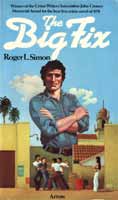 Simon,
Roger L - The Big Fix (Andre Deutsch Limited,
1974, 183 pp)
Simon,
Roger L - The Big Fix (Andre Deutsch Limited,
1974, 183 pp) Simon,
Roger L - The Big Fix (Andre Deutsch Limited,
1974, 183 pp)
Simon,
Roger L - The Big Fix (Andre Deutsch Limited,
1974, 183 pp)
It is ironic that a novel that deals with the counterculture from the viewpoint
of a sympathetic insider should win the 1974 John Creasy Memorial Award given
that the prize's namesake was a irasicable hack who detested both the left and
the young. The Big Fix nevertheless was indeed deserving of the title of "Crime
Novel of 1974" since not only is it a tenacious novel, but it also heralded
the arrival of a younger, hipper set of writers on the crime scene. Whilst these
writers were not to have the impact on the genre that say the New Wave of Science
Fiction writers did they still brought a contemporary sensibility to an art
largely languishing in the tough guy mileu of the 1950s. Today's feminist, gay
and multicultural Private Detectives owe much to Simon, but even without this
distinction the "Phillip Marlowe with long hair" character of Moses
Wine has proven to be enduring spawning many novels and an Oscar nominated film
adaption.
Noir fans need not fear though as this novel's plot incorporates a cynical toughness
of its own as Wine grapples with a conspiracy of murderous proportions while
onstensibly investigating a political smear campaign and the death of an old
lover. A former Berkley radical the protagonist could have become a big time
Jewish lawyer, but like many of his generation he got sidetracked by drugs and
rebellion before winding up in L.A. ekeing out an existence on the margins.
With his wife and kids leaving him for a dodgy guru Wine like many 30 something
baby boomers is contemptuous of authority, but happy to just get stoned and
just get by.
Whilst on the trail of an ex Yippie radical (obviously modelled on Abbie Hoffman)
whose Free Amerika Party is threatening the campaign of a liberal senator (probably
modelled on jerry brown) Wine finds himself the target of death threats and
beatings as he closes in on the pseudo-satanic sect (ala The Church of The Process)
actually behind the smears. As a writer obviously familiar with Wine's mileu
Simon's portrayls of ageing hippy has-beens and the darker side of L.A.'s wealthy
free wheeling hedonists are not only valid, but also cutting.
-IBM
"I lay on my bed under the Tensor light reading Rip It Off, Chapter Three,
"Crash Pads". It was a dreary production filled with the cliches of
the late and middle sixties set in an archaic psychedelic type. His prose sounded
like a bad underground disc jockey on uppers. I wondered who would pay $2.95
for the privelege of hearing about this or that 'trip' and what was considered
'groovy' or 'right on.' Some acid-damaged fifteen year old from Des Moines,
maybe, or a frustrated housewife in Waco, Texas, hoping for a way out into the
cool world. I had bought it of course, but i was looking for clues, some indication
of where Eppis might be hiding, betrayed by his own hand. Unfortunately of the
crash pads listed, only one happened to be in Southern California and that was
the LA County beach, a hiding place some thirty miles in length and a little
too open to hold a mimeograph machine. I had turned to the chapter on "free
Food" when I remembered I knew a friend of Eppis'- or at least an acquaintance-
Earl Spiedel, the record producer. Three or four years back, right after the
Chicago convention and at the height of Howard's celebrity, Earl had cut an
album with him and other radicals called Voices of Dissent. Not long ago I had
seen it remaindered at Thrifty-mart for 79 cents next to Gerry and The Pacemakers-
Gear The Merseyside Beat." (page 32)